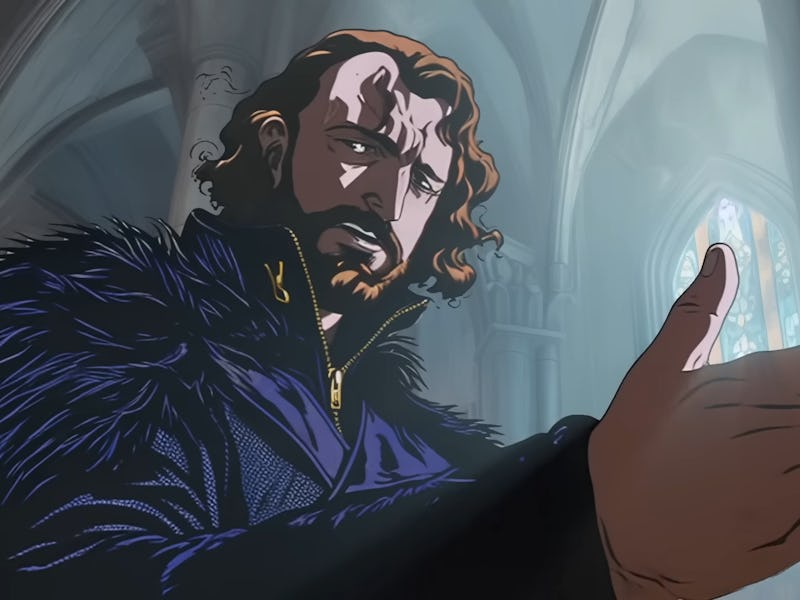Corridor Crew's AI-Generated Anime Isn't Just Callous and Craven — It's Also Dangerous
The controversial short film just feels gross.

In 1859, French art critic Charles Baudelaire wrote an essay bemoaning the latest disruption to the art world: the camera. Baudelaire believed the camera would make painters lazy, and other artists too reliant on the camera to do all the work for them.
“I am convinced that the ill-applied developments of photography, like all other purely material developments of progress, have contributed much to the impoverishment of the French artistic genius,” Baudelaire wrote. The camera, he said, “has become art’s most mortal enemy, and that the confusion of their several functions prevents any of them from being properly fulfilled.”
Art and technology have evolved plenty since 1859, with each successive generation finding a way to reconcile the boundless promise and ominous doom of every leap forward. But in 2023, a new “disruption” proposes legitimate ethical concerns: artificial intelligence. Though AI has been present for decades, its role in art has only been topical since 2016, when text-to-image and machine learning evolved significantly.
There have been some instances of AI machine learning being implemented in interesting, even noble, ways. But its explosion has led to new questions about the ethics of AI, and what it means to “create” with it. The latest cause of contention is an anime-inspired short film from YouTube channel Corridor Digital that employs AI on a video they shot. It’s not unlike rotoscoping, the process of animating live-action. But combine chest-beating arrogance with ethically abhorrent practices, and the conflict between proponents and opponents of AI art is understandably heating up.
Released on February 26, “Anime Rock, Paper, Scissors” is a seven-minute video that spiritually channels the aesthetics of gothic anime like Castlevania, Berserk, Trinity Blood, and JoJo’s Bizarre Adventure as two men engage in an epic bout of rock, paper, scissors. The response has been divisive, with some expressing admiration for what the film’s production represents, and others appalled by its mere existence. The next Baudelaire is somewhere on social media, and he’s dunking on this.
On its own, the film is more of a novel tech demo than an entertaining piece of art, as there’s something about the liquid-like hyperrealism of it that feels nauseating and dizzying. AI art frequently veers through the uncanny valley, producing works that look high-fidelity but feel eerie. “Anime Rock, Paper, Scissors” is a fantastic example of failing to realize that less can be more.
But Corridor Digital is proud of what they’ve made. They’ve devoted two other videos to its creation, a boastful one with the arrogant title “Did We Just Change Animation Forever?” and a separate video detailing the creation process.
Using both live-action footage and machine learning, Corridor Crew released a short film that’s produced a divisive response.
In the former video, co-director Niko Pueringer proposes that animation is the least democratized form of art, because studios like Disney are impenetrable to common people. Pueringer and his team believe AI is the great equalizer, because anyone can use it to come up with something (emphasis on “something”). Corridor is a firm believer in AI, and seem determined to be its missionary.
A lack of modesty isn’t the problem here, if only because that’s Corridor Digital’s brand. For the unacquainted, Corridor is a popular digital studio on YouTube that enthusiastically dives into the bleeding edge of filmmaking technology. They’ve made the blaster fire of Stormtroopers pinpoint accurate, and inserted the late Adam West into last year’s The Batman. Their experiments are typically compelling, sometimes funny, and often mesmerizing.
So Corridor’s own amazement at their creation is just the default setting of guys who mess around on their computers and get stoked about it. It’s not inherently unreasonable that they’d feel the same way about “Anime Rock, Paper, Scissors.” But while the video is intriguing, it’s ultimately bland gunk.
The root of the problem isn’t just its artistic shortcomings, although its gaudy visuals, unmotivated composition, and comically melodramatic dialogue that comes across more as a mockery of anime than a loving tribute to the medium doesn’t help. The real issue is how their AI tool works. As broken down by Vox last year, AI art aggregates existing images from across the internet — all used without the artists’ consent — to create something new.
It sounds fancy, and on a technical level, it is. It is also plagiarism. While art has always featured aggregation and remixes, from reinterpretations of Shakespeare to the work of Andy Warhol, AI is dispassionate and devoid of a message. It takes, and produces only a facsimile in return.
A commenter on Corridor’s YouTube videos succinctly summarized the problem with AI art and Corridor’s self-congratulatory tone: “This just seems like a way for tech guys to force their way into the artist’s circle while simultaneously stealing actual artists’ work to use for their ai to learn off of,” wrote user SouperRussian. “They should show this to the actual animators that visit them, I wonder how they’d react.”
As art evolves, there will always be questions about the ethics and integrity of its production. Like photography, AI could one day find its place in the artist’s toolbox. But for now, it doesn’t matter how high and mighty promoters sound when they talk about democratizing art; AI’s ability to create at a few keystrokes would grind to a halt the moment the artists it’s stealing from put their pens down. So far, it’s only democratized mass theft.
This article was originally published on